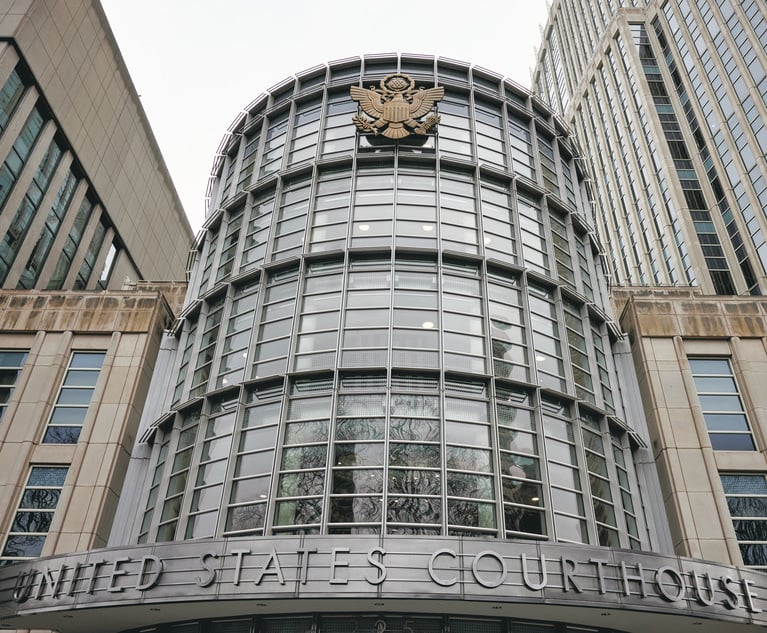Cornell Faces Suit Over Fraternity Hazing Death
The parents of a Cornell University freshman whose dead body was found at the bottom of a gorge after he allegedly was hazed by Phi Kappa Psi fraternity members have launched a 41-page negligence lawsuit against the university, the national fraternity and members of its Cornell chapter.
January 29, 2020 at 07:36 PM
5 minute read
 Cornell University main campus in Ithaca. Photo: Wikimedia
Cornell University main campus in Ithaca. Photo: Wikimedia
The parents of a Cornell University freshman whose dead body was found at the bottom of a gorge after he allegedly was hazed by Phi Kappa Psi fraternity members have launched a 41-page negligence lawsuit against the university, the national fraternity and members of its Cornell chapter.
The parents and plaintiffs lawyer David Bianchi not only contend that each defendant committed negligence leading to the death of 18-year-old Antonio Tsialas, they also contend vigorously that each defendant party, from the university and its police department to Phi Kappa Psi, have refused to give Tsialas' parents any meaningful information linked to their son's death and the ensuing investigation after his body was discovered Oct. 26.
Moreover, the complaint, lodged late Tuesday in Tompkins County Supreme Court, quotes past public statements by Cornell University president Martha Pollack about a years-long problem at Cornell with Greek system misconduct and hazing. And then the lawsuit alleges that Pollack and the university have long failed to take sufficient actions to stamp out the well-known, persistent problem.
Featured in the complaint and an accompanying news release issued Wednesday by Bianchi—a noted fraternity hazing-focused plaintiffs lawyer based in Miami—are allegations that Cornell's Phi Kappa Psi chapter lured the young Tsialas to its illegal "dirty rush" event freshman-hazing party Oct. 24, one day after the chapter had appeared before a university disciplinary body because of its alleged misconduct involving a different unauthorized event.
Meanwhile, the story of Tsialas' demise, as laid out in the complaint and by Bianchi in a phone interview with the New York Law Journal on Wednesday, is that it was parents' weekend at Cornell in late October. Bianchi and the Florida-based parents, John Tsialas and Flavia Tomasello, say in the complaint that Tomasello had arrived early at Cornell on Oct. 24 and had had a pleasant Thai dinner with her son.
 Antonio Tsialas. Courtesy photo
Antonio Tsialas. Courtesy photoThen Antonio Tsialas rushed off to attend Phi Kappa Psi's unauthorized "Christmas in October" rush party, allegedly attended by some 35 hand-picked freshmen. It was the last time he was ever seen alive again by Tomasello. The next day she searched desperately for her son and soon contacted campus police, and by that evening John Tsialas arrived at Cornell, as had been planned for parents' weekend, the suit alleges.
Cornell University's police department on Wednesday referred all questions related to Antonio Tsialas' death and to the lawsuit to the university media relations department.
Cornell University spokesman John Carberry, in a statement sent to the Law Journal, said that it "cannot comment on pending litigation" and that "Cornell University Police continue to actively investigate Antonio Tsialas's death."
Carberry's statement also asked anyone with information related to the death to contact Cornell at 607-255-1111. The university did not answer questions from the Law Journal related to the alleged withholding of information from Antonio Tsialas' parents on the investigation and circumstances of their son's death, or related to Pollack and the university's alleged negligence, including a failure to stop ongoing Greek system hazing.
Phi Kappa Psi executive director Ronald Ransom II said in brief email on Wednesday that "while we have been made aware of the lawsuit through media contact such as yours, we have not been served." He added that "generally, we don't speak to pending litigation."
According to the news release from Bianchi, who says he has litigated fraternity hazing cases for 25 years and who has developed a national reputation for his work, "to date, no one has come forward with information about why [Antonio] left the fraternity house or whether he left alone or with others. His body was found two days later at the bottom of a gorge. His wallet and keys were with him but his phone was missing. Its last known location was the Phi Kappa Psi fraternity house."
In the phone interview Wednesday, Bianchi told the Law Journal that he has "never before" experienced a comparable lack of information and stonewalling of his and the parents' questions about the circumstances surrounding a hazing death. The university, the national fraternity and several of its Cornell chapter officers named in the lawsuit have not stepped forward or have cut off questioning, he said.
For example, he said, "I just know that after I had a couple of conversations with the Cornell police chief in November, I was contacted by a Cornell University [in-house] lawyer who said I was no longer permitted to speak with him."
"The Cornell lawyer said if I have any questions for the police chief I should submit these writing," added Bianchi. He said he quickly followed up with 23 written questions in November, none of which have been answered.
Bianchi noted that when serving the complaint on the defendants, he will simultaneously serve on all defendants discovery requests.
The lack of information for the parents has made their pain and grief "immeasurably" worse, he said.
This content has been archived. It is available through our partners, LexisNexis® and Bloomberg Law.
To view this content, please continue to their sites.
Not a Lexis Subscriber?
Subscribe Now
Not a Bloomberg Law Subscriber?
Subscribe Now
NOT FOR REPRINT
© 2025 ALM Global, LLC, All Rights Reserved. Request academic re-use from www.copyright.com. All other uses, submit a request to [email protected]. For more information visit Asset & Logo Licensing.
You Might Like
View All
The Met Hires GC of Elite University as Next Legal Chief

NY Appellate Panel Cites Student's Disciplinary History While Sending Negligence Claim Against School District to Trial

'No Evidence'?: Big Law Firms Defend Academic Publishers in EDNY Antitrust Case
3 minute read
'Substantive Deficiencies': Judge Grants Big Law Motion Dismissing Ivy League Price-Fixing Claims
3 minute readTrending Stories
- 1Contract Technology Provider LegalOn Launches AI-powered Playbook Tool
- 2Court of Appeals Provides Comfort to Land Use Litigants Through the Relation Back Doctrine
- 3Amid the Tragedy of the L.A. Fires, a Lesson on the Value of Good Neighbors
- 4Democracy in Focus: New York State Court of Appeals Year in Review
- 5In Vape Case, A Debate Over Forum Shopping
Who Got The Work
J. Brugh Lower of Gibbons has entered an appearance for industrial equipment supplier Devco Corporation in a pending trademark infringement lawsuit. The suit, accusing the defendant of selling knock-off Graco products, was filed Dec. 18 in New Jersey District Court by Rivkin Radler on behalf of Graco Inc. and Graco Minnesota. The case, assigned to U.S. District Judge Zahid N. Quraishi, is 3:24-cv-11294, Graco Inc. et al v. Devco Corporation.
Who Got The Work
Rebecca Maller-Stein and Kent A. Yalowitz of Arnold & Porter Kaye Scholer have entered their appearances for Hanaco Venture Capital and its executives, Lior Prosor and David Frankel, in a pending securities lawsuit. The action, filed on Dec. 24 in New York Southern District Court by Zell, Aron & Co. on behalf of Goldeneye Advisors, accuses the defendants of negligently and fraudulently managing the plaintiff's $1 million investment. The case, assigned to U.S. District Judge Vernon S. Broderick, is 1:24-cv-09918, Goldeneye Advisors, LLC v. Hanaco Venture Capital, Ltd. et al.
Who Got The Work
Attorneys from A&O Shearman has stepped in as defense counsel for Toronto-Dominion Bank and other defendants in a pending securities class action. The suit, filed Dec. 11 in New York Southern District Court by Bleichmar Fonti & Auld, accuses the defendants of concealing the bank's 'pervasive' deficiencies in regards to its compliance with the Bank Secrecy Act and the quality of its anti-money laundering controls. The case, assigned to U.S. District Judge Arun Subramanian, is 1:24-cv-09445, Gonzalez v. The Toronto-Dominion Bank et al.
Who Got The Work
Crown Castle International, a Pennsylvania company providing shared communications infrastructure, has turned to Luke D. Wolf of Gordon Rees Scully Mansukhani to fend off a pending breach-of-contract lawsuit. The court action, filed Nov. 25 in Michigan Eastern District Court by Hooper Hathaway PC on behalf of The Town Residences LLC, accuses Crown Castle of failing to transfer approximately $30,000 in utility payments from T-Mobile in breach of a roof-top lease and assignment agreement. The case, assigned to U.S. District Judge Susan K. Declercq, is 2:24-cv-13131, The Town Residences LLC v. T-Mobile US, Inc. et al.
Who Got The Work
Wilfred P. Coronato and Daniel M. Schwartz of McCarter & English have stepped in as defense counsel to Electrolux Home Products Inc. in a pending product liability lawsuit. The court action, filed Nov. 26 in New York Eastern District Court by Poulos Lopiccolo PC and Nagel Rice LLP on behalf of David Stern, alleges that the defendant's refrigerators’ drawers and shelving repeatedly break and fall apart within months after purchase. The case, assigned to U.S. District Judge Joan M. Azrack, is 2:24-cv-08204, Stern v. Electrolux Home Products, Inc.
Featured Firms
Law Offices of Gary Martin Hays & Associates, P.C.
(470) 294-1674
Law Offices of Mark E. Salomone
(857) 444-6468
Smith & Hassler
(713) 739-1250






